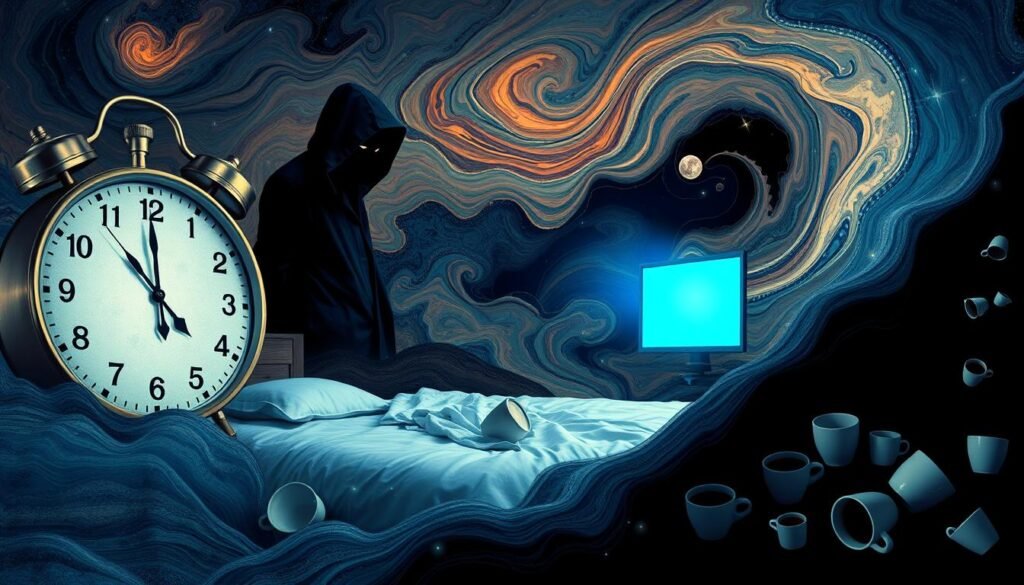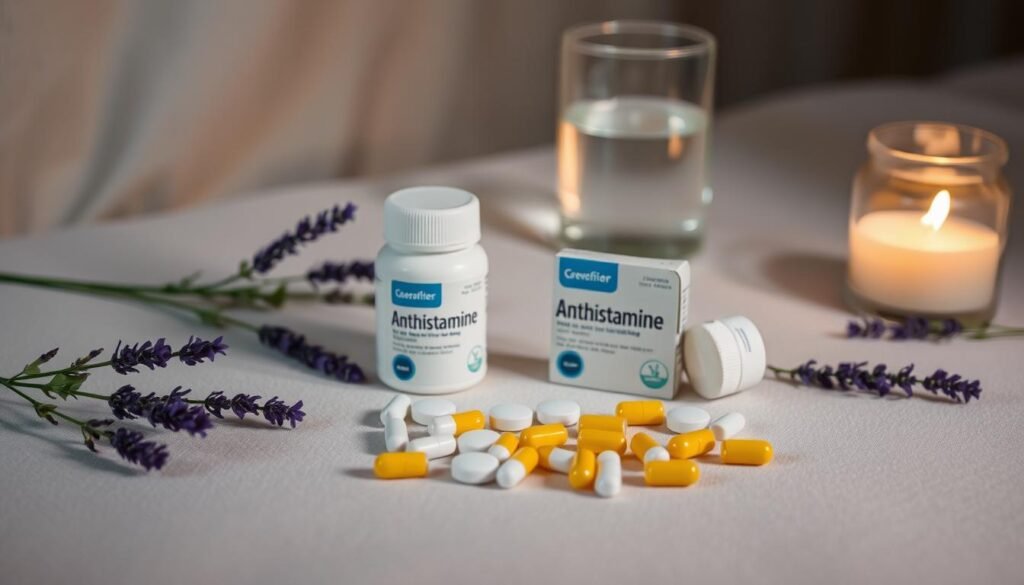Did you know that about 32% of American adults face anxiety at some point? This struggle hinders their quest for restful sleep. Thankfully, antihistamines are proving helpful against both anxiety and sleep troubles. Medicines like Benadryl and hydroxyzine, known for their calming effects, can aid in better sleep. They’re also effective for managing anxiety.
In this article, we dive into using antihistamines for sleep and anxiety relief. We’ll look at how improving sleep can ease anxiety, offering insights into effective remedies. Whether you face occasional insomnia or ongoing anxiety, natural and store-bought solutions could pave the way to better rest and less worry.
Key Takeaways
- Antihistamines can provide insomnia relief by promoting nighttime sedation.
- An estimated 32% of Americans will experience anxiety disorders during their lives.
- Hydroxyzine is FDA-approved for anxiety treatment and also serves as a sleep aid.
- Common over-the-counter antihistamines like Benadryl may help reduce anxiety symptoms but come with potential side effects.
- Using antihistamines for sleep should always be done with medical consultation to avoid misuse.
- Practicing good sleep hygiene can enhance the overall effectiveness of antihistamines.
- Long-term use of antihistamines may lead to harmful side effects, making it essential to seek guidance from a healthcare provider.
Understanding Sleep and Anxiety
Sleep is key to being healthy. It helps our brains work well and keeps our mood steady. Sadly, a lot of Americans don’t sleep enough. Over one-third don’t get the seven hours needed each night. Not sleeping enough can cause heart disease and diabetes.
The Importance of Sleep for Overall Health
Getting enough sleep is vital for overall health. It helps us learn, remember, and stay emotionally balanced. Not sleeping enough can hurt these aspects. Lack of sleep leads to worse thinking skills and more anxiety.
This makes life harder when we’re awake. So, we must make good sleep a priority.
How Anxiety Affects Sleep Quality
Anxiety really messes with sleep quality. People with anxiety often can’t sleep well. It leads to insomnia and troubled nights. Anxiety makes it hard to calm down at night.
Over time, this causes a cycle of bad sleep and more anxiety. Finding ways to deal with both is key.
| Aspect | Impact |
|---|---|
| Sleep Deprivation | Higher risks of chronic illnesses |
| Anxiety | Decreased sleep quality and insomnia |
| Overall Health | Improved with adequate sleep |
Common Causes of Insomnia
Many things can make it hard for people to sleep well. Stress and anxiety are big reasons for this. They can lead to problems that make it hard to relax and sleep. Knowing why this happens is the first step to sleeping better.
Stress and Anxiety
Stress and anxiety can overwhelm you, making sleep seem impossible. You may lay awake worrying, unable to calm your mind. This can lead to not sleeping well, making you feel worse overall. About 20% of adults sometimes can’t sleep because they’re stressed.
Health Conditions Affecting Sleep
Health problems like obesity, diabetes, and pain can make insomnia worse. These issues can make a bad sleep cycle that also harms your health. Some medicines can also mess with your sleep. It’s important to deal with these health problems to sleep better.

| Health Condition | Impact on Sleep |
|---|---|
| Obesity | Increased risk of sleep apnea and discomfort when sleeping |
| Diabetes | Frequent urination can disrupt sleep cycles |
| Pain Disorders | Chronic discomfort can hinder the ability to fall asleep |
| Anxiety Disorders | Heightened alertness can cause difficulty in relaxing |
Natural Sleep Remedies and Their Benefits
Exploring natural sleep remedies can help improve sleep and tackle insomnia. Melatonin and valerian root are great for their benefits.
Melatonin: The Sleep Hormone
Melatonin helps control your sleep cycle. It’s great for those with sleep issues or jet lag. About two-thirds of adults in the U.S. have tried it for better sleep.
People usually take 3 to 10 mg of it. This can lead to longer and better sleep. Some may feel nauseous or sleepy during the day, but these side effects are mild.
Valerian Root: Herbal Sleep Support
Valerian root is used for better sleep. Taking 300 to 600 milligrams before bed can help, especially with insomnia. It often works after taking it for two weeks or more.
It’s a good option with few side effects like mild headaches or weakness. This makes it a nice choice over usual sleep meds.

| Remedy | Typical Dosage | Potential Benefits | Common Side Effects |
|---|---|---|---|
| Melatonin | 3–10 mg | Improves sleep duration and quality | Nausea, daytime sleepiness |
| Valerian Root | 300–600 mg | Enhances sleep quality | Headaches, weakness |
Looking into more natural sleep remedies can be insightful. They show promise in improving sleep quality. For more info, you can read up on natural sleep solutions.
What Are Antihistamines?
Antihistamines are drugs used mainly for allergies. They stop histamine from causing symptoms like sneezing and itching. First-generation antihistamines also help with sleep because they make you drowsy.
First-Generation vs. Second-Generation Antihistamines
There are two types of antihistamines. First-generation antihistamines, like Benadryl, are good for sleep but you might need more over time. They can cause drowsiness which helps with sleep.
Second-generation antihistamines, like loratadine, don’t make you as sleepy. They are better for daytime since they don’t cross into the brain much. But, they might not help with sleep as much.
Common Antihistamines for Sleep
Diphenhydramine and doxylamine are common for sleep. You can buy them without a prescription. They help with insomnia but can cause dry mouth and dizziness. Use them as directed and talk to a doctor if you have health issues.

| Type | Examples | Common Uses | Side Effects |
|---|---|---|---|
| First-Generation | Diphenhydramine, Doxylamine | Sleep aids, Allergy relief | Drowsiness, Dry mouth, Dizziness |
| Second-Generation | Loratadine, Cetirizine | Allergy relief | Headache, Nausea, Abdominal pain |
Antihistamine for Sleep and Anxiety: Benefits and Risks
Antihistamines are a big help for those with sleep and anxiety issues. They block histamine receptors in the brain to help you feel sleepy. This is great for short-term sleep problems. But, they’re not meant for long-term insomnia.
How Antihistamines Promote Drowsiness
Benadryl and Hydroxyzine are examples of first-generation antihistamines. They are used for their calming effects. These meds can ease sleep problems linked to anxiety by blocking histamine, a chemical in your brain that keeps you alert. This blockage leads to drowsiness, aiding both sleep and anxiety relief quickly.
Potential Side Effects of Antihistamines
While antihistamines help, they can also cause side effects. First-generation types might lead to daytime sleepiness, dizziness, and dry mouth. You might also experience blurred vision and low blood pressure. Second-generation kinds could cause headaches, sore throat, and stomach pain. Especially for older folks, it’s key to talk to a doctor before using these.
Long-term use is not advised due to lessening effects and serious risks.
To fully understand your options, look into reliable recommendations like this guide on anxiety pills. Using antihistamines wisely can improve your nightly routine while keeping you healthy and safe.
Over-the-Counter Antihistamines
OTC sleep aids, like antihistamines, are a quick fix for sleep problems. They are easy to find and include well-known types such as diphenhydramine and doxylamine. These help you sleep due to their calming effects. But, using them right is key to avoid bad side effects.
Popular Over-the-Counter Options
Diphenhydramine is often in Benadryl and helps you sleep for about seven hours. It works best two to four hours after you take it. A usual dose for sleep is 50 mg before bed. Doxylamine, in Unisom, needs a 25 mg dose for rest.
Watching out for how these drugs affect you is important. They can cause dizziness, dry mouth, or make it hard to focus. Using them too much can make you depend on them. So, it’s best to use these for a short time only.
Recommended Usage for Sleep Support
To use OTC antihistamines right, keep these tips in mind:
- Stick to the dose advice for your age and health.
- Don’t drink alcohol when taking these drugs to avoid bad reactions.
- Add them to a regular bedtime routine for the best effect.
- Talk to a doctor if you have asthma or glaucoma.
- Try other aids like melatonin or valerian root that might be safer.
For more help, look at trustworthy sources. Being informed helps you make smart choices about these sleep aids.
Alternative Natural Sleep Aids
Many people look for alternative sleep aids to help them sleep better and boost well-being. Popular choices include magnesium and lavender aromatherapy. These natural solutions can help relax the body and make for a peaceful night.
Magnesium: A Relaxation Mineral
Did you know magnesium is vital for sleeping well? It works on your brain’s chemicals to ease your nervous system. This makes you relaxed and ready for sleep. Nature Made’s Magnesium Citrate is awesome because you get 250 milligrams of magnesium easily. It’s great for those wanting to add magnesium to their sleep habits.
Lavender: Aromatherapy for Sleep
Lavender is popular for its calming effects. It’s used a lot in lavender aromatherapy to make sleeping easier. Breathing in lavender scent at night can help you sleep longer and more soundly. Plant Therapy Lavender Essential Oil is flexible, so you can use it however you like. Adding lavender to your night routine can make other sleep aids work better and bring more calm to your rest.
Best Practices for Improving Sleep Quality
Improving your sleep quality can make a big difference in your life. It helps you feel better and boosts your overall health. Focus on building better sleep habits and eating right, along with regular exercise.
Developing Healthy Sleep Habits
It’s vital to have good sleep habits for better sleep. Here’s what you can do:
- Maintain a consistent sleep schedule by going to bed and waking up at the same time every day.
- Create a relaxing bedtime routine to signal your body that it’s time to wind down.
- Ensure a comfortable sleep environment, free from distractions like light and noise.
- Limit screen time an hour before bed to promote higher melatonin levels in the body.
- Consider using sleep aids such as lavender essential oil, known for its calming effects.
The Role of Exercise and Diet in Sleep
Being active and eating right affect your sleep. Exercise improves sleep, but don’t do it too late. Try to workout earlier in the day if you can.
The food you eat also plays a role. Some foods help you sleep better. Here’s a list of foods that are good for sleep:
| Food Item | Benefit for Sleep |
|---|---|
| Tart Cherry Juice | Boosts melatonin production. |
| Bananas | Rich in magnesium and potassium, aiding relaxation. |
| Almonds | Source of magnesium, which can improve sleep quality. |
| Chamomile Tea | Promotes relaxation and may reduce insomnia symptoms. |
When to Seek Professional Help
Persistent sleep issues, known as chronic insomnia, can disrupt daily life and overall health. This condition involves trouble falling or staying asleep. It happens three or more nights each week and affects about 14.5% of U.S. adults. Recognizing these signs is crucial, because it affects more than just being tired. It could point to other health or mental issues that need expert help.
Identifying Chronic Insomnia
When sleepless nights become a common thing, it’s important to look at your habits. Symptoms include tossing and turning, waking up a lot, and feeling tired during the day. It’s smart to talk to a doctor or nurse. They can help figure out how to make sleep better. This might include therapy, which works well, or medicines designed just for you.
Exploring Treatment Options with a Healthcare Provider
Talking to a healthcare expert opens up ways to treat chronic insomnia. They might suggest medicines for both sleep and stress. Other options might be discussed if natural remedies don’t work. If you’re having trouble sleeping, talk to a pro about what can be done just for you.